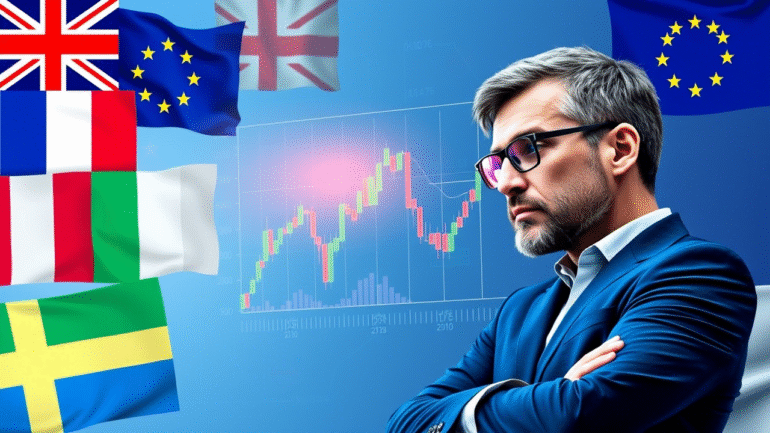Ubisoft, Tencent Seal Deal Worth $1.25 Billion for Gaming Business
French PC game developer Ubisoft has revealed that this long-awaited deal to spin out most of the company’s franchises such as “Assassin’s Creed” into a subsidiary to be backed by Chinese tech giant Tencent should close by year-end 2025.
Finexsi, the independent expert, issued a fairness opinion validating the transaction on behalf of Ubisoft shareholders. According to the deal, Tencent will put in €1.16 billion (or $1.25 bn) in the new company and receive a 25% share, while Ubisoft will struggle to maintain majority control.
In the financial year to March 31, 2025, the company booked revenues of €1.85 billion, down 20.5% on the previous year and below expectations. Company stated “lower than expected partnerships” as the main cause for underperformance and even recorded a small operating loss of €15.1 million.
Euro Gains Against Dollar and Sterling
The euro gained 0.2% against the USD and 0.3% against the pound amid present market volatility birthed by unfolding trade developments between the U.S. and China. The current up-and-down flow from recent tariff cuts left the strategists lamenting over an irreversible economic damage caused by trade tensions.
However, analysts at ING warned that any positive trade news will soon get swept by evidence of actual damage wrought on the U.S. economy and will, therefore, make investors unwilling to chase wins in the dollar until some clarity is given.
Roche Warns: Trump Drug Pricing Policy Threatens $50 Billion U.S. Investment
Swiss pharmaceutical leader Roche warned about the drug pricing executive order from President Donald Trump and threatened to halt the firm’s planned $50 billion-in-U.S. investment throughout five years.
Roche told CNBC that the proposed policy, which relating U.S. drug prices to lower international prices, would undermine U.S. stature as the world leader in pharmaceutical innovation and possibly lay off jobs; the company also highlighted the inefficient healthcare system at present in which a vast proportion of drug costs go to insurers and providers and not to the manufacturing companies.
U.S. Stocks Open Higher On Optimism around Trade
Today saw a positive opening to the U.S. markets with the S&P showing a gain of 0.17%, the Dow Jones gaining around 0.2% and the Nasdaq climbing by about 0.5%. The demolition of the temporary suspension of U.S.-China tariffs fuels the growing appetite for risks.
The S&P 500 has now recouped earlier losses suffered from trading turmoil; analysts say any further progress in trade talks between the U.S. and China would be even more critical in maintaining investor sentiment.
Trump’s Middle East Tour Greases the Way for Mega Deals
Top level meetings with Saudi Arabia and Qatar under U.S. President Donald Trump’s Middle East tour culminated in pledges of $600 billion worth of U.S. investments in Saudi Arabia and the lifting of U.S. sanctions on Syria.
Reports then kindled tension that Qatar had made a $400 million offer of a luxury jet to Trump, though the offer is still up for discussion and it had not been finalized over the course of the trip.
Novo Nordisk Licenses in a $2.2 Billion Collaboration with Septerna for an Obesity Drug
Danish pharmaceutical firm Novo Nordisk entered a licensing and collaboration agreement with the U.S. biotech firm Septerna, worth $2.2 billion, for the oral small molecule medicine innovations for obesity, type 2 diabetes, and other cardiometabolic disorders.
This bidirectional mode intends to guide Novo’s pipeline beyond products such as Wegovy and Ozempic and maintain a hold in the fast-growing obesity therapy market.
European Markets Are Mixed with Burberry Gaining after Initial Cost-Cutting Plans
The European markets opened mostly subdued, with the Stoxx 600 hovering just under the flatline, threatening to snap out of its four-day winning streak. Burberry was a big winner, up just shy of 15%, after revealing cost-cutting plans that should save £60 million ($79.9 million).
Analysts remain cautious, stating that it will take time to turn the tide for Burberry while focusing back on classics, including trench coats.
Alstom Shares Plummet despite Better-Than-Expected Earnings
Shares in the French train maker nosedived by 17% after it reported a set of improved financial results. Sales were up organically, at 6.6%, to €18.5 billion ($20.8 billion), while adjusted EBIT margin improved to 6.4%.
Investor reaction appeared to reflect some concerns over a slight drop in orders, but analysts highlighted the very strong cash flow performance and promising project pipeline.
Renk Awaiting Spending Undertakings at the NATO Summit
The German defense supplier, Renk, in the meantime, announced Q1 revenues to the tune of 15% to €273 million ($306.7 million), just shy of market expectations. The company awaits governmental spending undertakings at the coming NATO Summit in June.
CEO Alexander Sagel sees Germany potentially spending 3-3.5% of GDP on defense, with clearer procurement targets from NATO being paramount for the sector.
European Currencies Rally After Cooler U.S. Inflation Data
The euro traded up 0.5% against the U.S. dollar, hitting $1.124, while the British pound and Swiss franc were also rallying. The rally came after the release of the U.S. inflation number that was lower than expected at noon on Tuesday, easing some pressure off the greenback.
Analysts say slowing U.S. Inflation is Partly to be Blamed, as It Shifts Investor Focus away from Aggressive Rate Hikes.
Bank of England Policymaker Warns of Rising Inflation Expectations
Bank of England policymaker Catherine Mann expressed concern at the rise of household expectations of inflation, explaining thus her recent vote to hold interest rates steady. While she had favored a much larger rate cut earlier this year, unemployment and inflation trends meant that she had to now change those views.
She repeated that the Bank must be ready to restore price stability, taking into account the risks to growth.
Burberry Announces Restructuring Following Sales Drop
Luxury fashion house Burberry announced new proposals for restructuring as sales dipped less than expected in Q4. The company said the reorganization could affect 1,700 jobs worldwide in a broader attempt to restore profitability.
Shares initially popped 9% after the announcement but still linger significantly below pre-pandemic levels. Analysts remain cautious about the timeline for recovery.
TUI Misses Revenue Expectations Due to Easter Timings
TUI, the tour operator, missed its revenue expectations, blaming the change in timings for Easter holidays this year. Q3 revenues averaged at €3.7 billion ($4.14 billion), below analyst forecasts of €3.86 billion.
However, the company maintained full-year guidance and posted an adjusted loss of €207 million, better than the expectations.
UK Immigration Policy Sparks Fear of a Labour Shortage
Businesses in the United Kingdom are sounding those alarm bells over some new immigration proposals aiming to reduce migration. Tighter rules include stringent language requirements and higher education thresholds for work visas.
Industry leaders warn that many sectors-from hospitality to agriculture-are already facing labour shortages and that these changes could make it worse.
Germany Confirms April Inflation at 2.2%
Germany’s annual HICP rate has been confirmed at 2.2% for April, affirming the preliminary figures. Further data offer a glance on the stance of the European Central Bank on monetary policy, with inflation continuing to ease across the Eurozone.




